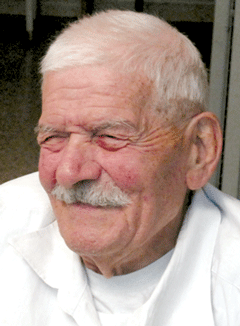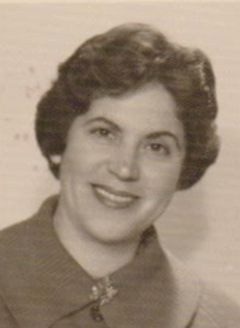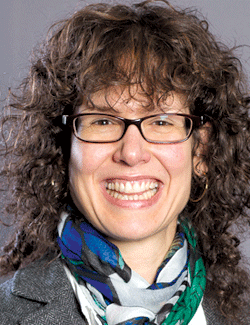The unexpected discovery of an aunt, long thought to have perished in the Holocaust, led to a remarkable reunion for the family of Iris Tzafrir, of St. Louis Park
By ERIN ELLIOTT BRYAN / Community News Editor
Yehoshua (Lieblich) Tzafrir always felt alone in the world, believing himself to be the only member of his immediate family to survive the Shoah. But late last year, he first learned that his oldest sister had indeed survived the war and left behind a family of her own.
This past November, Yehoshua and his family met with the family of his sister, who died in 1973, for a reunion that most likely never would have taken place if not for questions posed by Iris Tzafrir, Yehoshua’s daughter, who lives in St. Louis Park.

-
Yehoshua (Lieblich) Tzafrir, pictured in 2010, always believed he was the only member of his family to survive the Shoah. (Photos courtesy of Iris Tzafrir)
“My household was a heavy one. I always felt the presence of sadness and a sense of loss growing up — those emotions were part of everything that took place in our family,” Iris wrote in a d’var Torah she gave in 2010 at Adath Jeshurun Congregation. “I knew where the sadness and sense of loss came from, to an extent, mostly from stories that Aba [Father] told and from his writings.”
Yehoshua Lieblich was just 13 years old in March 1941, when his family was forced into the Krakow Ghetto and separated. His parents and four younger siblings went to one building, and he stayed with his brother, Israel, and oldest sister, Scheindela Lea, in another building. That was the last time he saw his parents, and young brothers and sisters.
Yehoshua stayed with his brother and sister for a year, until both Israel and Scheindela Lea “disappeared,” according to Iris, who speaks and writes about being a second-generation survivor.
“He talks a lot about how [Scheindela Lea] helped him and took care of him, she was so tender and almost a mother figure during the time they were together. And then one day she went to work and she didn’t come back,” Iris told the AJW about her father, who turns 87 this month. “She was a beautiful girl and he just talks so fondly of her, and with admiration. She was also incredibly smart. So he remembers all these wonderful attributes about her… But for him, as a 13-year-old, she disappeared from his life and he never saw her again.”
Yehoshua remained in the Krakow Ghetto until March 1943, when he was taken to Auschwitz-Birkenau. He was finally liberated from Buchenwald in April 1945.
Yehoshua later married his wife, herself a Shoah survivor from Hungary, and the two made their home in Israel, where Yehoshua took on the more Hebrew-sounding surname of Tzafrir. They were among a group of people who started Kibbutz Mishmar-Hanegev, in 1946.
He has lived in Israel ever since; he and his wife raised their four children there.
In 2010, Iris and her siblings — brothers Assaf and Ouri, and sister Ora — took their father on a trip back to his native Poland and Germany, to visit some of the sites that were important in his life before and during World War II. After she returned to Minnesota, Iris began to write a memoir to document the family’s history and to reflect on what it means to be the daughter of Shoah survivors.
“It’s about taking that experience and how do we move forward?” Iris said. “It’s all about really living life fully versus staying in the tragedy and in the past.”
During her research process, in October 2013, Tzafrir submitted queries to the U.S. Holocaust Memorial Museum in Washington, D.C., regarding her grandparents, Tuvia and Miriam, and her father’s six siblings: Scheindela Lea, Israel, Tzvi, Sara-Eitah, Roza and Yehudit.
She received no information on any of them — except Scheindela Lea.

-
Scheindela Lea (Lola) Lieblich Ehrlich, who was separated from her brother Yehoshua during the Shoah, survived and moved to Israel in 1949.
“I got over 50 documents for her and I was just amazed,” Iris said. “This was telling us that Scheindela Lea survived the war and not only that, she moved to Israel after the war.”
Iris’ brother, Assaf, then went to the Israel Interior Ministry, where he learned that she indeed had lived and died in Israel. Another phone call to the Burial Society of Israel informed the family of her burial site in Haifa — at S’de Yehoshua Cemetery (Yehoshua’s Field) — and that she left behind a husband, son and daughter.
The documents from the Holocaust museum indicated that Scheindela Lea Ehrlich had come to Israel in 1949, with her husband, Tzvi, and son, Tuvia. A daughter, Ahuva, was later born in Israel.
Using Israeli phone books, Iris’ brother, Ouri, was able to locate Tuvia, who put him in touch with Ahuva. The families were finally reunited in Israel in November.
“My dad is one of the people that talked about [his Holocaust experience] and he’s a prolific writer, so we know a lot about him and about his family and his whereabouts, but my cousins hardly knew anything,” Iris said. “They knew that all of [Scheindela Lea’s] family was murdered, that’s what she told them, but they didn’t know anything. They did not even know my father’s name… In their household, the whole Shoah timeframe of their parents was a black hole. It was not talked about.”
Since the reunion, the cousins were able to piece together Scheindela Lea’s story, using Yehoshua’s recollections and the documents from the U.S. Holocaust Memorial Museum.
After being taken from the Krakow Ghetto, Scheindela Lea was at the Płaszów concentration camp and later a slave labor camp in the Ukraine. She was liberated from Buchenwald in 1945 — the same camp from where her brother was liberated.
“Their paths never crossed,” Iris said.
After the war, Scheindela Lea went back to Poland to search for her family and found her first cousin, Tzvi Ehrlich, whom she later married. The couple lived in Germany before immigrating to Israel with their young son.
“As a result of all of this, our cousin really got into it, about learning and collecting information… and our cousin started to look things up,” Iris said. “And in the week that I was in Israel, we also learned that [Tzvi Ehrlich]… was one of the Jews on Schindler’s List.”
Iris said this experience gave her father “tremendous happiness and joy.” He asked Iris many questions about how she was able to find his family members and he thanked her for being “such a persistent person.”
“Through this process, we found a first cousin that my dad has that lives in Florida, and we also identified a whole number of family members that live in the United States who are distant cousins, so I’m in touch with them now,” Iris said.
“I talk about the transfer of attributes that happen as a second-generation [survivor]; not only is there lack of trust, there’s also this feeling that we’re left alone in the world, which is how my parents ended up in World War II. There was nobody in their nuclear families that was left, they were alone in the world. So one of the biggest things that happened for me, personally, is I don’t feel alone in the world anymore. And it’s a very powerful feeling.”
(American Jewish World, 2.28.14)























Mazal Tov on the family reunion! Miracles do really happen.